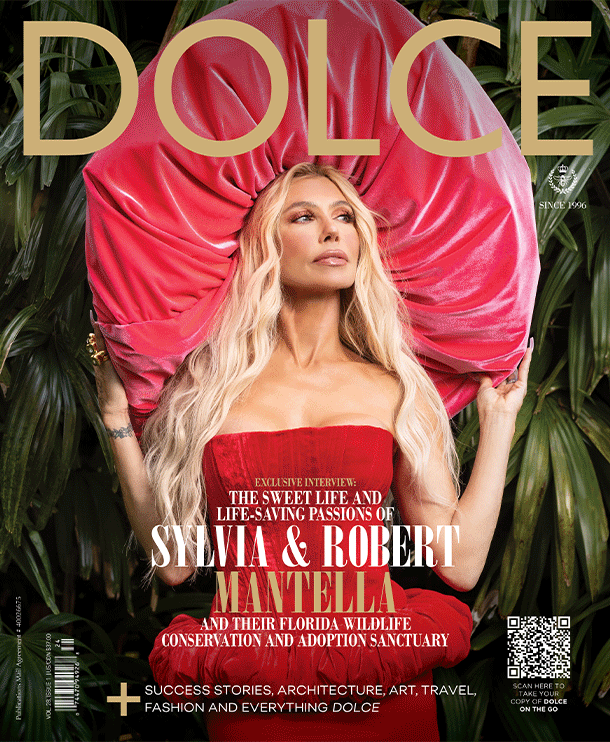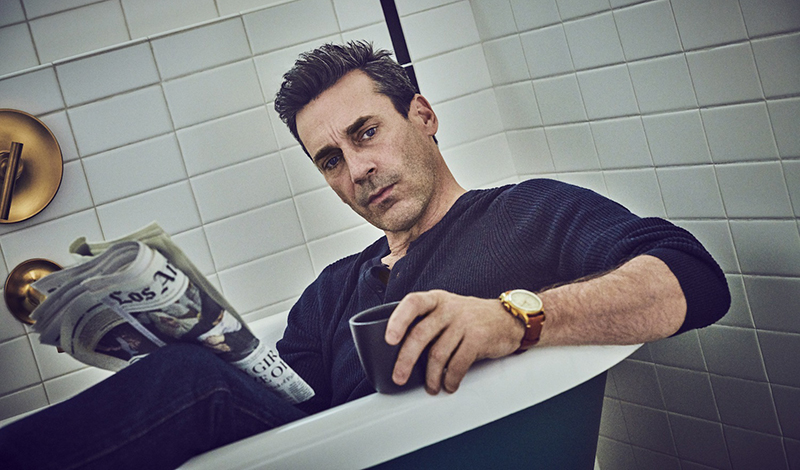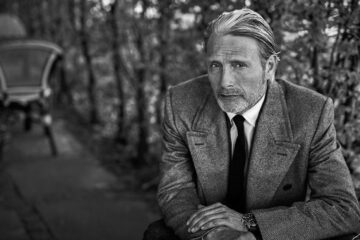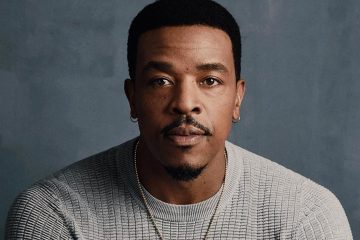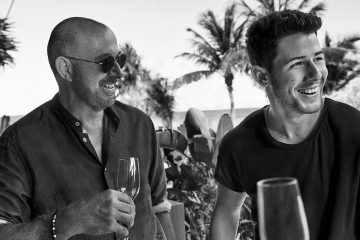Jon Hamm: Strength of Character
Emmy Award-winner, style icon and communicator extraordinaire of the 1960s, actor Jon Hamm has certainly made his mark in popular culture, but it seems we haven’t seen anything yet.
Seven years. Ninety-two episodes. An Emmy. And an indelible mark on popular culture and fashion. And is there a man in this world who can wear a suit better than Jon Hamm? If there is one, I’ve never met him. He has personified masculine elegance and the art of matching a tie to a suit. Deservingly, he was named one of People magazine’s sexiest men alive in 2008. But when you have left such an imprint on your profession, how easy is it to leave a character behind and reinvent yourself? Jon Hamm is doing just that with his latest roles, making sure everyone knows he is not (and never was) Don Draper, the protagonist of the TV show Mad Men. He was just doing a job, but doing it extremely well. Some of his recent movies, such as the political-action thriller Beirut, saw him emerge as a credible leading man in a movie set in a foreign land. And then there’s his comedic side, with the movie Tag and multiple smaller parts in comedies. The years 2019 and 2020 seem to indicate that his career has reached a new level, with a leading role opposite Natalie Portman and a part in the Top Gun sequel.
“I Remember Really Focusing On Trying To Be Prepared For Whenever I Would Get An Opportunity To Do Something And Then When I Would Finally Be Able To Get A Part, Make The Most Of It… It Took Three Years. I Was Bartending, I Was Waiting Tables. But I Never Forgot The Reason That I Came Out Here, Which Was That I Came Here To Pursue A Career”
Having once described himself as “not overly ambitious,” there is something down-to-earth about Hamm. Living not far from the interview location, it looked like he had just been taking a walk in the neighbourhood and suddenly decided to join in — “This is so convenient, it’s bonkers.” In real life, Hamm rarely wears a suit. He lives in Los Angeles, but not in the Hollywood Hills or in Beverly Hills. He plays baseball in his neighbourhood. He lives a simple life, true to his Midwest upbringing. Losing both his parents at an early age, Hamm had to overcome daunting odds to will his way to success. He taught Grade 8 students right after graduating. Standing at an impressive 6-2, he quickly puts everyone at ease with his self-deprecating humour. On Sundays, he plays baseball in a local park with some friends. Who knew Don Draper was such a nice guy?
EARLY LIFE
Q. You’re from the Midwest, from St. Louis.
A. Yes, born and raised.
Q. Maybe because of Mad Men, or because of Hollywood, I imagine people have an image of you as more of a coastal guy. Can you tell me about growing up in St. Louis?
A. When I was a kid, I just never thought I’d go anywhere but St. Louis. It’s not a place that necessarily inspires travel. It’s not like growing up in Europe or New York, where you’re exposed to all kinds of cultures. It’s not a knock on it, either. It is what it is. It’s a place called “the gateway to the West.” Everything I learned about the world, I learned through James Bond movies and books. In a pre-Internet era, I was a library kid and a big reader and I loved watching films. My childhood and adolescence were a very normal Midwestern existence. It’s only recently that I’ve gotten out to see the world. Last year was the first year that I’ve lived in L.A. more than anywhere else.
Q. I’ve heard you describe yourself as a polite Midwesterner. Can you explain the polite Midwestern culture and how different it is from how people are here in the West? I was talking in New York City with some people in the industry who work with Brad Pitt, and they were telling me that “he’s such a polite Midwestern boy.”
A. I don’t know that it’s necessarily that different; it’s just that it moves at a slower pace than New York or L.A. There’s a little more of a family-oriented vibe. A lot of people who are from there, stay there. The coasts have more people who are transplanted. Therefore, you’re kind of reinventing yourself, seeking fame or fortune, etc. So in the Midwest, people are a bit more settled. A little more of a parochial, a mellow kind of attitude. A little more conservative, too.
Q. Do you still feel like a Midwest guy deep inside?
A. Sure. I think where you grew up is where your soul is. I’ve met a lot of very fancy people in the world and I’m always kinda of humbled by it. I’ve got friends whose lives I look at and wonder, How can you live like that? That’s such a crazy existence: you’re on private planes and fashion shows, red carpets and private islands and boats, and private dinners in Paris and London. It’s so fascinating to me, because I feel it’s so foreign to me. And yet, I’ve done my fair share of that stuff, too. It never gets normal.
Q. Do you sometimes go back to St. Louis?
A. I go back every now and again, mostly for events and things like that. I do have some family left there. I try to see them when I go back. But I don’t go back very often.
Q. I knew you moved to L.A. at age 25, but it’s only recently that I’ve heard you actually drove there from St. Louis in a Corolla. That’s quite a road trip. What was going through your mind during that trip?
A. I finished my teaching job and I spent my last summer in St. Louis. And I pointed my car west. I didn’t stop until I came to California. It’s a fairly long trip.
I would say.
But it’s worthwhile. It’s something I had to do. I had to pay for it myself and I couldn’t afford the plane. That’s the way it goes. I packed my car, fit everything that could fit in it and headed west. It’s daunting; it’s very much a scary proposition. I didn’t really have a job waiting for me. I just thought, Well, I’m not getting any younger. I better get there while I can. And I did it.
Q. What was going through your mind during the trip?
A. I hope I make it. My car wasn’t a great car by any stretch of the imagination. It was a 1986 Toyota Corolla that had its own issues with the engine. It would overheat all the time. It was daunting.
Q. When you first moved to L.A. to become an actor, what did you think of the life here, compared to where you were from?
A. I thought it was very different. I remember being very intimidated by the physical size of L.A. and by the awesome quality that its nature has — mountains and then the deserts over there, and the ocean’s over there. It’s very different than where I’m from.
“Can Fall In Love Just As Easily At 16 As You Can At 70. They’re Both Very Different. Obviously, They’re Very Different Perspectives In Life The Older You Get, But They’re Both Great”
Q. Where you’re from it’s more like the Great Plains.
A. There’s trees and hills — and that was kinda it; nothing as radical as L.A. We have a river, but it’s not exactly like seeing the Pacific Ocean. It was very different, it was wild and intimidating, but I got a few friends out here, and like anything else, you break it down into more manageable spaces and you realize that you’re only gonna use a little part of L.A. You don’t necessarily need to know the whole 10,000 square miles, or whatever it is. I like being out here. I was always a very “outdoorsy” kind of kid, and the lifestyle out here encourages that. Weather’s always beautiful. You feel like you’re wasting time if you’re inside. And there’s so much to do. Most of it’s free, or incredibly inexpensive, to go hiking or to go to the beach. The outdoors stuff is fun to do. I play sports: I play tennis and I play baseball. I try to hike every day. It’s too nice not to.
Q. Every day?
A. I try to. Hiking trails are practically in my backyard.
Q. Your career took some time to take off. What made you stay in the game and not lose faith during the lean years?
A. I don’t know, honestly, other than I didn’t really have anything else to do. I thought I’d keep trying this until something happens. I set a deadline on myself. I wanted to be self-sufficient as an actor by the time I was 30. I know a lot of people who are successful who got it a lot sooner. I don’t know why it didn’t happen to me. I guess everything happens for a reason. It’s fine the way it happened. I certainly feel like I’ve earned it. Part of being an actor, for most actors, is dealing with rejection. Some people are incredibly lucky their whole careers, get famous early and never have to look back, but I think every actor has experienced in some way, shape or form losing out on some part they wanted. Because there’s always a bigger fish. That’s a good life lesson. And part of it is realizing that there are a lot of people out here trying to do the same thing you’re doing. And a lot of them have a lot more credits than you.
And connections.
Connections, experience, etc. That can be terrifying in many ways. But you go, “OK, I hope I can legitimately find my way in this world.” I remember really focusing on trying to be prepared for whenever I would get an opportunity to do something and then when I would finally be able to get a part, make the most of it. It’s really difficult to maintain any kind of momentum, because L.A. is very much a place where inertia can set in. That part of it is real scary. You think, Well, I hope I can do this. At a certain point, you just got to do it. It took three years. I was bartending, I was waiting tables. But I never forgot the reason that I came out here, which was that I came here to pursue a career.
Q. There were moments of doubt?
A. Sure. Of course. You think, I didn’t get that part. Will I ever get any part? Is this ever gonna happen? Is there something else I should be doing? I could be doing better. Should I study harder, should I be more prepared? There are a million questions you ask yourself, and you just try to knock them one by one. The only thing you’re really in charge of as an actor is yourself. All the other stuff is out of your control. That’s a really hard place to be. You think, I did everything right; I did X, Y, Z. I did all these things the way they were supposed to be, and it still didn’t work.
WORK
Q. A lot has been said about your portrayal of Don Draper in Mad Men. I was thinking about it, and one thing I thought about is even though it’s a dark and complex character, what struck me is how he shows authority. He is in his position because of his talent, and people respect his skills. Was it easy to show this, since it was your first major role?
A. I think the interesting thing about Don Draper is that he’s playing a part. He’s obviously not Don Draper, he’s Dick Whitman. So I think that part of that authority or poise or professionalism or command is an act. We see the “behind the curtain” a couple of times during the series, where he loses it and he shows his true colours.
For the most part, he’s very confident in what he does, and he’s got a track record of showing that what he does, people respond to. That only adds up over time to a person that, even if he’s putting it on, is fairly confident.
Q. How did you find that self-confidence?
A. Well, you’re an actor; someone else is writing the words for you. You just have to do your best and hope that people will buy it. In my case, I was fortunate enough that people did.
Q. Have people working in advertising told you if the show reflected their world accurately?
A. I get it all the time. Everybody thinks they are Don Draper, or they knew a Don Draper — a lot people in the advertising world I know, including some very close friends. Obviously, it’s a very different landscape now, as it should be, but there are still enough guys who are from that era who can certainly remember the hijinks and the behaviour.
Q. Michael Douglas once told us in an interview he was very surprised how some people saw Gordon Gekko as a role model, a modern super hero, whereas he tried to play him as a bad guy: “the guy ended up in jail!” I’m wondering if the same thing happened with Don Draper, and if people’s interpretation of the character surprised you?
A. Yeah. Honestly, I think we live in the world, now, of the anti-hero. It’s a real strange thing that people put on these guys who are conflicted about what they want and what they do. What makes people like Gordon Gekko, like Don Draper, like [Breaking Bad’s] Walter White so interesting is that they represent the complexity that is humanity. There was a certain place in the world for stories about people who are “all good,” for superheroes. That’s exciting for some people to see. But there’s also a place for, “Oh yeah, this guy makes mistakes, just like we all do.” I hope they won’t end up like him, though. Don Draper’s kind of real sense of confusion on who he is, what he’s meant to do, who he’s supposed to be with, which make Don such an interesting character, are very appealing for people to watch.
Q. Beirut is the first movie you’ve “carried on your shoulders.” Is this a different kind of responsibility for you? Did you approach the part in a different way?
A. I think the movie I did for Disney, Million Dollar Arm, was the first movie I carried. Beirut, I think, is a great film. Tony Gilroy wrote a great script about a really complicated issue, which is the beginning of institutionalized terrorism in the Middle East and why that happened, what happens when the power vacuum is created, what happens when a population is marginalized. You get a combination of religious and economic strife and then you put hundreds of billions of petro dollars into it. It’s a very complicated situation, and I think Tony’s script addresses it really well.
Q. You’re in the new Top Gun sequel. What did the original movie mean to you? I suppose you saw it in the ’80s? What part do you play, and how was working on the movie? Did you do a lot of actual flying? How about those shades?
A. The original movie came out in ’86, so I was 16 years old, the perfect demographic to see that movie. It had fast planes, fast cars and pretty girls. It was a watershed movie, not only for those who watched it, but [also] for Tom [Cruise] and his career. This guy has been a movie star for four decades. And he’s still doing it. Honestly, it’s was an honour just to be asked to be part of it, because it’s an iconic piece of movie history. I was pleased to do my small part in it. I’ve seen the footage and it’s spectacular. It’s rare for me to be in a big budget, big movie like that. It’s been good.
Q. Did you do a lot of actual flying?
A. I did not, no. Fortunately, I didn’t have to do any of that. Those who did, I give crazy props to them, because they had an awful lot of training to do. They’re not actually flying the plane, but they’re in the plane being flown by a professional. It’s a lot, to say the least.
Q. The original movie is really representative of a time where you would make movies without a hint of irony or sarcasm. The theme song, the look of it — there’s a certain naïveté to a film like Top Gun; that’s what made its charm in a way. Today, even kids’ movies are also made to appeal to the parents; there are always so many levels. Is the sequel going for the same vibe as the original, or is it made in more of a contemporary style?
A. The thing about Top Gun is that it’s a straight-up crowd pleaser. It’s a fun movie that really does all the things that you want it to do. It’s got the airplane dog fights and the snappy dialogue. It appeals to everybody. Even the people who didn’t see the first movie, or weren’t alive when the first movie came out, can like it.
Q. Did you get to wear the shades?
A. Oh yeah. I did get to wear the sunglasses. I think there will definitely be a spike in the sale of leather jackets and sunglasses when the movie comes out [laughs].
Q. You have another movie coming out, The Report, that’s a bit political. How did you approach playing a real-life character?
A. I play Denis McDonough, who had a big role in the Obama administration. There was a lot of malfeasance back then, and it was all done under the guise of, “We have to do this because of terrorism, because if we don’t, we’ll have another 9/11.” There was so much hysteria over what would happen. Sometimes you end up making some real big mistakes. What the movie tries to say is, “Yeah, we made a lot of mistakes, but at least in this particular instance, we owned up to them. We knew that, OK, we’re not allowed to do that, and we shouldn’t.” You think, At least the system works. Our government showed accountability. Even though it was widely limited in its scope, there was still some accountability to be had, and that’s a big deal. That kind of thing is important, especially nowadays, where it seems nobody cares about anything. Everything is an argument. That’s not how it should be; there should accountability.
Q. You’ve also filmed with Clint Eastwood (The Ballad of Richard Jewell). That must be so exciting and inspiring for an actor. I’ve interviewed Morgan Freeman several times, and he always told me the best things about working with Clint.
A. He really is. He’s an impressive human being, first of all, because he’s almost 90 years old and he’s still making movies. He’s there every day. He’s so committed and dedicated to do good work and to tell stories that need to be told. With The Ballad of Richard Jewell, this is kind of the first time in modern times that you saw this sort of rush to judgment, this sense of being convicted in the court of public opinion. “This guy must’ve done it, because he just looks the part.” And that’s kind of sad. We see it now more than ever, unfortunately. With Twitter, and everybody having micro-aggressions, you can be tried, convicted and punished before you even realize you’ve done anything wrong. It’s a weird place we are in, in history: we have so much access to information, yet so little ability to tell what’s real and what’s fake.
“I Think That Society Is Correcting Course In A Way That’s Very Positive. There Is A Better Sense For Most People That Other Perspectives Are Valid”
FASHION
Q. What are your fashion vices and inspiration? Do you like suits and watches, or are you more of a T-shirt and jeans guy outside of set?
A. I don’t really wear jewelry. I wear an Apple watch now. But if I’m going to a place where I have to look nice, I’ll wear a nice watch. I have a few. I like wearing nice suits, I really do. Everything matches, you look good, you look well put together, you look mature. If it’s a good suit, you look great. I like that. But I probably could go through my closet and get rid of half the shit there and I’d be just fine. I’m not a guy who has to wear something different every day; I’m not a peacock at all. But I like to look nice.
PERSONAL
Q. How do you think the perception of the modern man has changed from when you were growing up to now?
A.I grew up quite a long time ago. It was rapidly shifting in the ’70s, when you saw the rise of second-wave and third-wave feminism. That was pushing into the fore the idea of a man who was comfortable with his feminine side, comfortable with his feelings. The “Me” generation, the therapy generation, all of that stuff was coming out. I think it was in response to Nixon and Vietnam. The traditional male ideas of “Father knows best” and “We tell you what to do” were proven to be demonstrably false, in many ways, because people went, “Well, Nixon is a liar,” and we got into this crazy situation in Vietnam, because we were told we were doing the right thing — we clearly weren’t. Who are we listening to and why? Why are we meant to listen to men in that capacity? That’s when you saw a lot more female senators and a lot more female presence in government happening. That’s shifting even more with the Time’s Up and the #MeToo stuff. Women are rightfully demanding that there’d be a reckoning for this behaviour that’s never been OK, that shouldn’t be tolerated. It won’t be ignored anymore. I think that men’s jobs, these days, is to listen more than they talk. I’ve been able to take that one to heart and really understand that as a straight white male, I’m living in an incredibly privileged position in society. Not only in American society, but in international society and culture, as well. It’s important to understand that it’s real. Just because you don’t like something, doesn’t mean it doesn’t have merit. That’s a big thing for a lot of white men to get their head around. That’s why you see the rise of Trump and these other things. Some men just don’t want to let go of that.
There’s resistance.
There’s resistance any time someone’s asked to give up any power. When it’s a class or a group that’s held power collectively since the beginning of time, obviously, there’s going to be a little pushback. But I think that society is correcting course in a way that’s very positive. There’s a better sense for most people that other perspectives are valid. Just because you think something is good or funny, doesn’t mean it has no value. The thing I really appreciated about all this is, taking a moment before you get on your high horse, before saying someone is right or wrong. Take a moment to understand their point of view. Wherever you are, male or female, wherever you are on the gender spectrum, wherever you are racially, it’s important to understand that other people come at things differently. To disavow that as being not worthy of any kind of validation is silly, I think.
Q. I was thinking, when rewatching Mad Men episodes, the vibe is almost like the anti-#MeToo.
A. Sure. But even so, what I thought the show did really well is, we showed perspective.
Q. True. It’s not like you endorsed it. The show critiqued it.
A. You saw the perspective of someone like the character Joan, who’s been in it long enough and who knows how to work it. Contrast that with someone like Peggy, who’s brand new to it and has to navigate her own way and ends up doing it incredibly successfully. And someone like Betty, who’s totally committed to that thing and is still very unhappy. Someone like Sal, from a homosexual perspective, closeted or not, he’s also trying to navigate that whole thing. It’s tricky. Ostensibly, the show is about Don’s path and career, but it’s also about how our society is changing. It’s a good show.
Q. Does it get harder to fall in love as time goes by, or easier?
A. Oh boy, that’s a question for the ages. I think that’s specific to where you are in your life. You’re a young person and think, Oh, I’ve got it all figured out, then life has a way of showing you that maybe you don’t. It’s more related to the stage you are in your life. You can fall in love just as easily at 16 as you can at 70. I think they’re both very different, obviously, they’re very different perspectives in life the older you get, but they’re both great.
WRITTEN BY CEZAR GREIF
PHOTOGRAPHY BY CHARLIE GRAY
STYLING BY KRISTEN INGERSOLL

